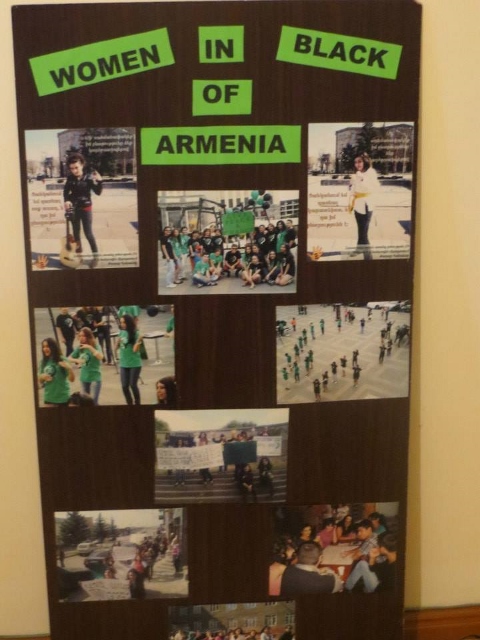Articel about WIB Armenia on Mamacash webpage: “The next generation Women in Black”
 On a clear and chilly day, women gather at Republic Square, a large central town plaza in Armenia’s capital city, Yerevan, that hosts the Ministries of Finance, Government, Transport, Foreign Affairs, and Territorial Administration. The women are silent. Peaceful. Their purpose: to protest war and political conflict between Armenia, Azerbaijan and Turkey, while also claiming both their prerogative to shape political decision making and their entitlement to fundamental human rights.
On a clear and chilly day, women gather at Republic Square, a large central town plaza in Armenia’s capital city, Yerevan, that hosts the Ministries of Finance, Government, Transport, Foreign Affairs, and Territorial Administration. The women are silent. Peaceful. Their purpose: to protest war and political conflict between Armenia, Azerbaijan and Turkey, while also claiming both their prerogative to shape political decision making and their entitlement to fundamental human rights.
Armenia is one of the latest chapters to join the Women in Black (WiB) movement, a worldwide network of women committed to ending violence through peaceful means—vigils, educational opportunities, public programs, as well as support and partnership with both global WiB organizations and other human-rights agencies. While most groups are composed of mothers and grandmothers, the Armenian chapter is driven by the passionate young women and girls who set up, in 2001, Society without Violence (SWV). This group of young disenfranchised women, marginalized by an exclusive and rigid patriarchy, conjured their collective strength and organized to educate the young women and girls living in remote regions of Armenia. It was almost inconceivable that they would succeed. But they have managed to interrupt an ideological system aimed at systematically silencing them.
The cold hard fact, the roadblock that WiB Armenia continue to confront, is that in the capital, especially in more secluded border towns (near Azerbijan, Turkey and Iran), women are regularly subject to domestic violence, sexual trafficking and political isolation, along with educational, professional and vocational restrictions. Women living in conflict-ridden regions lack access to education, employment, health and housing. They are isolated from development initiatives, including those aimed at strengthening women’s rights (Society Without Violence, Women Count: Civil Society Monitoring Report 2013, Republic of Armenia). In addition, because the Armenian economy remains weak as a result of blocked borders, a number of the region’s men travel to work abroad, while women are left to domestic service trades, which do not provide for sick or maternity leave or pension benefits.
This situation gains traction from the insidious and widespread belief that women are somehow “less than”—that they belong in the domestic sphere and have no place in public conversations. WiB Armenia has made interrupting this belief their core focus. This, because that belief manifests in a political engine dominated by men. Although the population is 52% female, women are virtually absent in political decision-making. Because women are not present to represent their own human interests, there is a significant lack of momentum with regards to women’s civil and political rights, despite some movement regarding reproductive and maternal health. Such beliefs also give rise to an increased rate in what are certainly tragic sex-selective abortions (in 2011, the Parliamentary Assembly of the Council of Europe called specifically on Armenia to provide both support and awareness-raising initiatives with regards to these abortions). In addition, SWV’s 2011 Survey Regarding Gender Stereotypesindicates that almost 44% of women believe that women provoke men to beat them; 60% of men and 40% of women believe that women cannot be effective leaders; and nearly 64% of women regret that they are not a man.
Despite these significant obstacles, WiB is changing things in Armenia. In direct protest both to the war and to the insistence that “women stay out of politics,” these young women participated in the 2014 Peace Walk to End War. They were targeted and castigated by the press as “betrayers to the Nation.” Since 2012, WiB has engaged a number of young women in political action, both training and educating them regarding their rights and organizing skills. They’ve put together meetings along the border regions of Iran and Azerbaijam to inform girls and young women about the international WiB movement, activism and organization.
The SWV and WiB have created the first platform for young Armenian women activists to participate in public dialogues—even to set the terms of these conversations. They hold regular wakes and vigils for victims of violence. The many members between the ages of 16 and 27 have developed innovative actions, from flash mobs to public performances. They’re using art and the power of their own numbers to push for a new gender equality and legislative actions to support that agenda. Now, girls and young women in Armenia, despite considerable barriers, have claimed a public voice and provided a new and rejuvenated impulse to the WiB movement. These young women are, in their own words, “feminists, activists, and human rights defenders who are reformulating the idea of peace and shaping another reality where the culture of violence has no place.